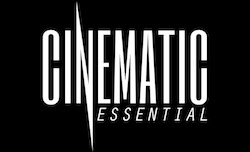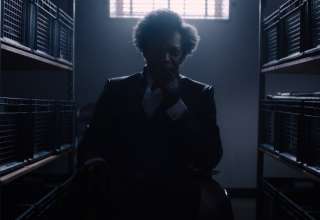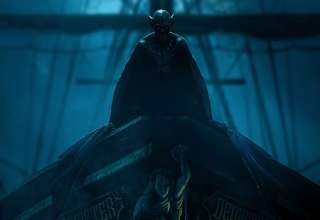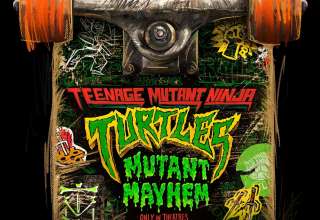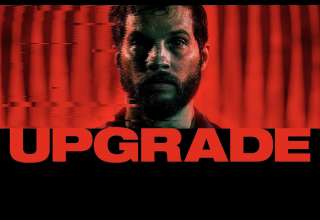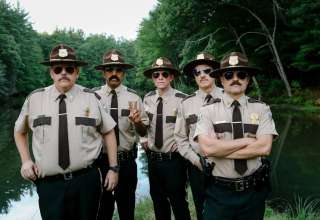During their trip to Boston, I was fortunate enough to speak with actress Anya Taylor-Joy and writer/director Cory Finley about Thoroughbreds., their film also starring Olivia Cooke and the late Anton Yelchin. I already knew this picture was a unique one based on its origins and content, but sitting down with them allowed me to learn more about what made it one of a kind. It also gave me the opportunity to learn a little more about these two as artists with aspirations that appear to stretch beyond the status quo.
Cinematic Essential: What’s the transition from playwright to filmmaker been like?
Cory Finley: It’s been very fun. It’s been a lot of fun. There’s been a lot to learn very quickly. I think I knew I wanted to direct this movie because I saw a very particular tone for it. And at least in the sort of playwriting I was doing before which is off-Broadway or off off-Broadway, the playwright gets a lot of input into the technical process, you get to speak to the actors a lot and all those sorts of things. And I knew that the way that filmmaking functions, a lot of those roles would go straight to the director. There was a lot of learning on the job. That was challenging but fun.
What did you think of his first time as a director?
Anya Taylor-Joy: I used to call Cory a unicorn on set because he just waltzed in with utter grace and was super calm the whole time like nothing was stressful. It’s really wonderful when you feel like you are in the hands of somebody that understands that you are very much invested in the character and gives you so much space to breathe and be the character, but the way that they guide you back into something. You know, Cory kind of takes you to the side and you have a very private, intimate conversation and then you go back into the scene. The respect of your own personal relationship with the character rather than just trying ti control everything is really nice because it meant that he trusted us and everything that he spoke about. He’s an incredible director.
Finley: It’s easy when you have such good actors.
Describe what it was like being on-set?
Taylor-Joy: We had a lot to fit in in a short period of time. It was a well oiled machine. Cory’s sensibilities as a playwright created a situation, because I’ve never done a play, created some situations where I got to do some pretty cool “play” things but on a movie set. That was pretty awesome.
Finley: I was interested in making sure we had few moments where we didn’t have long, unbroken takes. I think often those are used to show off your ability to move a camera and do all these crazy things. There was a little bit of that, but I also wanted to have moments where it did feel like the rhythm of a play where it was just dependent on the actors performance and chemistry in shot together in real-time. And those were some of the most challenging bits because we couldn’t move on until we had everything right within a scene.
How do you go about selecting the roles to pursue?
Taylor-Joy: I’ve been lucky that my ladies have found me. I read a script and I sort of become kind of obsessive about it, but it’s very instinctive. Do I hear the characters voice in my head? Do I feel like I can do them justice? How would I follow this? Do I keep coming back to the script? Is it keeping me up at night? Who’s the director? Am I really interested? Do I want to be molded by this guy’s or this lady’s hands? It’s a whole bunch of things that have to come together. And if one of those isn’t right, usually you’re not supposed to do it.
How would you describe your character Lily in Thoroughbreds?
Taylor-Joy: Poor Lily. She’s a very interesting young lady. I think she’s somebody who most people can see that is striving so hard to be a picture of perfection that is simply not attainable and instead of releasing that and allowing herself to be a human being she punishes herself, and that allows her to become this sort of vision of messed up darkness in a way. What was very interesting/exhausting/wonderful about playing her is that she does have all of these layers. So we go in day one and she’s all perky and straight and smiling and everything’s great. Then you realize as her morality washes away, you really see that she’s just this kinetic bundle of nerves and rage and darkness. So it was really interesting playing all of these different levels of her because it meant that as an actor I got to play around with the tone of my voice with my poster with the whole physical aspect of her, so that was really cool.
How different was she from the usual characters you’ve played so far?
Taylor-Joy: Lily, didn’t have powers. So that was different. (laughs) It was different because two days before, I literally just came off playing Charlotte in Barry. So I was playing two actual girls my age for the first time on-screen. And playing that without having a man with 24 personalities locking you inside of a room. You have to subdue your emotion and tone it down a bit. So you actually have so much more color in your performance because you have to color grade everything to match your surroundings rather than just being like “I’m panicked!”
What was the reason behind wanting to tell this story from the perspective of two young women?
Finley: Early on, it started with certain themes I was interested in exploring, and I felt the best way into that was through these characters that were this age and this gender within this world. And once I made the decision, I didn’t think too much about it. I was certainly aware as a male writer that I wanted to have female collaborators on the script and that my actors would be a huge part of bringing it to life in a way that was accurate. But I think I tried to just write them as characters rather than thinking of them as a particular gender or age or thinking about any of the things that separated them from my own experience.
How much do you think he got right?
Taylor-Joy: Olivia (Cooke) originally thought Cory was a girl because the name could swing both ways. I thought it was kind of uncannily accurate. Especially certain little moments when Liv and I would look at each other and be like “How does he know? This is weird.” But it’s nice to hear him say that he wasn’t writing in reaction to gender because they are both very intelligent, very witty and interesting people. The fact that they’re women and we’re getting to see it on-screen in a situation where you don’t usually get to see it makes it even cooler. But I think if you were to take away gender politics and have it just be straight up, the writing is really strong and very interesting to listen to.
When turning this into a film, were there any parts you wanted to keep but couldn’t?
Finley: That’s a good question. It was mostly expansion because film storytelling is a more efficient form as far as page count. And when you’re able to jump around locations and use cuts in the way your able to you can fit a lot more story in. So almost all of the changes were expansion from play to screenplay. There were a few moments I think on a stage you can really fall into this almost hypnotic sort of musical rhythm just watching characters talking for a really long time. So there were bits where we maybe learned a little bit more about the politics of what was going on at the high school that we never saw in the play and little character detail stuff, but I think the story as a story improved overall by losing all of those bits. And all the kind of thriller stuff and the silent scenes and some of the stuff that happened toward the end were new to the screenplay and didn’t exist in the play form.
Do you see yourself leaning more toward film or stage plays after this?
Finley: I love both. There are things you can do in both and I’ll keep writing plays. Right now I’ve had such an awesome experience with this and I love the additional toolbox that a film director gets to play with that I’m definitely focused on film at least at the moment.
What about you as an actress? Are stage plays something you’d be interested in?
Taylor-Joy: Yeah, I just had my first play audition. Had two callbacks, so we’ll see. It’s interesting because in this lifestyle, you never really know what’s going to happen. I’ve been working back to back, in April it will be four years. I’m not actively searching for something different, but I love to challenge myself and I love to grow. I think that having the opportunity to revisit a character and go through an entire arc everyday, I can’t even imagine. Leaving that play will probably destroy me. It’s the sort of vibe of I just love the chance to get to know the character that intimately and to keep playing around with it rather than just letting go.
In terms of future projects, what types of genres would you like to step into?
Finley: I will always be interested in stuff that’s character driven. That’s always my starting point. Then I’m always interested in stuff that combines genres and plays with different genres. I think of this as little bit of a psychological drama meeting a dark comedy. I think such an interesting variable in film storytelling is just an audiences preconceptions about a genre and genre conventions. So movies that are conscience of the genres they exist in and play with that and meld those elements are always going to be appealing to me.
What would you want audiences to get out of this film?
Finley: First, I would want them to be entertained. You can’t do anything else if you don’t satisfy that requirement. I want people to think about wealth and privilege and about…
Taylor-Joy: What constitutes good and bad?
Finley: Yeah, and morality. The relationship between morality and our emotional centers.
Taylor-Joy: Cory’s right. It is very entertaining, but I want people to really relish in the dialogue because the dialogue is wicked smart and really fun to listen to. It’s interesting because at Sundance, a lot of people were stopping themselves from laughing. I think they were judging themselves and we’re like “No, it’s funny. You can actually laugh at that.” So yeah, I just want people to enjoy the dialogue.
